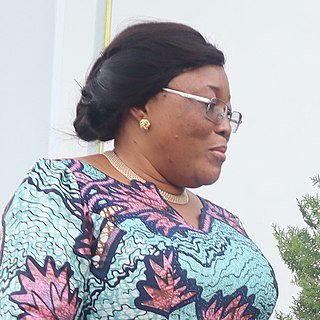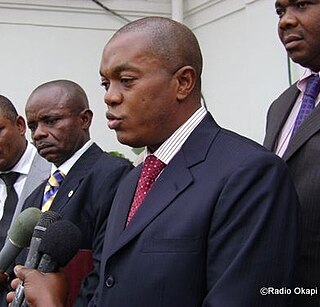
The Third Republic of the Democratic Republic of the Congo is a unitary state with a five-level hierarchy of types of administrative division. There are nine different types of country subdivision in a new hierarchy with no new types but with two from the previous one abolished.

Direct elections in the Democratic Republic of the Congo occur for the Presidency, National Assembly, and provincial assemblies. The Senate, and provincial governors are elected indirectly by members of the provincial assemblies.

Ituri Province is one of the 21 new provinces of the Democratic Republic of the Congo created in the 2015 repartitioning. Ituri, Bas-Uele, Haut-Uele, and Tshopo provinces are the result of the subdividing of the former Orientale province. Ituri was formed from the Ituri district whose town of Bunia was elevated to capital city of the new province.

The Senate is the upper house of the Parliament of the Democratic Republic of the Congo. The senate was established in 1960, abolished in 1967 and re-established in 2003.

Article 2 of the Constitution of the Democratic Republic of the Congo divides the country into the capital city of Kinshasa and 25 named provinces. It also gives the capital the status of a province. Therefore, in many contexts Kinshasa is regarded as the 26th province.

The territories of the Democratic Republic of the Congo are administrative divisions of provinces. Territories are further divided into sectors, chiefdoms, and communes. They are led by an administrator and, for the most part, take the name of the town that is their administrative center.

Lemba is one of the 24 communes that are the administrative divisions of Kinshasa, the capital city of the Democratic Republic of the Congo.

Limete is one of the 24 communes that are the administrative divisions of Kinshasa, the capital city of the Democratic Republic of the Congo.

Matete is one of the 24 communes that are the administrative divisions of Kinshasa, the capital city of the Democratic Republic of the Congo.

General elections were held in the Democratic Republic of the Congo on 30 December 2018, to determine a successor to President Joseph Kabila, as well as for the 500 seats of the National Assembly and the 715 elected seats of the 26 provincial assemblies. Félix Tshisekedi (UDPS) won with 38.6% of the vote, defeating another opposition candidate, Martin Fayulu, and Emmanuel Ramazani Shadary, backed by the ruling party PPRD. Fayulu alleged that the vote was rigged against him in a deal made by Tshisekedi and outgoing President Kabila, challenging the result in the DRC's Constitutional Court. Different election observers, including those from the country's Roman Catholic Church, also cast doubt on the official result. Nonetheless on 20 January the Court rejected his appeal and declared Tshisekedi as the winner. Parties supporting President Kabila won the majority of seats in the National Assembly. Félix Tshisekedi was sworn in as the 5th President of the Democratic Republic of the Congo on 24 January 2019, making it the first peaceful transition of power in the country since it became independent from Belgium in 1960.

Gubernatorial elections took place in 20 out of the 21 new provinces of the Democratic Republic of the Congo on 26 March 2016. The elections were the first to take place since the 2015 repartitioning which saw the 6 largest provinces of 11 split into 21 new ones to form in total the 26 provinces mandated by the DRC constitution. In most of the provinces, the elected governors are members or affiliates of the Alliance of the Presidential Majority.

Gubernatorial elections took place in 11 out of the 26 provinces of the Democratic Republic of the Congo on 26 August 2017, with a second round held in three provinces on August 29. Elections in three other provinces were not held until 21 December 2017. The elections occurred after several governors had been dismissed. Applications of potential candidates were submitted to the Independent National Electoral Commission from 21 to 25 July 2017, with a period for the review of the applications from 26 to 30 July. On August 2, the list of candidates was published and the following two days were granted for any appeals. More than half of the provinces were won by candidates of the Alliance of the Presidential Majority, though some went to independent opposition candidates.
Barthélemy Mukenge Nsumpi Shabantu was a Congolese politician who served as President of Kasaï Province from 11 June 1960 to January 1962 and July to September 1962. He was a president of the Association des Lulua-Frères, a Lulua ethnic syndicate, and a leading member of the Union National Congolaise. Though initially allied with nationalist Patrice Lumumba, he later denounced him and aligned himself with more moderate politicians. Following the division of Kasai Province in late 1962, Mukenge became Minister of Health and Minister of Social Affairs of the new Luluabourg Province. He later served as Governor of Kivu Province and on the Political Bureau of the Mouvement Populaire de la Révolution. He withdrew from politics in 1974 and died in 2018.
Médard Autsai Asenga is a Congolese politician who was governor of the former Orientale Province, and later a National Representative.

General elections were held in the Democratic Republic of the Congo on 20 December 2023. Combined elections were held for the President, 484 of the 500 members of the National Assembly, 700 of the 716 elected members of the 26 provincial assemblies, and for the first time under the new constitution, 951 members of a scaled down number of commune (municipal) councils. On election day, the Congolese government extended voting to 21 December for polling stations that had not opened on 20 December. Agence France-Presse reported that some polling stations would open as late as 24 December.

Julie Ngungwa Mwayuma is a Congolese (DRC) politician. In 2022 she became the Governor of Tanganyika Province. The province was supported by the United Nations Organization Stabilization Mission in the Democratic Republic of the Congo (MONUSCO) until June 2022.
The cities of the Democratic Republic of the Congo are administrative divisions of provinces with the exception of Kinshasa which itself has the status of a province. Cities are further divided into communes. They are led by mayors except for Kinshasa which is led by a governor.

Lumumbaville is a new city being developed in Sankuru province, in central Democratic Republic of Congo. It was created to honor the national and panafrican hero Patrice Lumumba, independence leader and first prime minister of the country, who was executed in 1961 during the Congo crisis.

Senate elections will take place in the Democratic Republic of Congo in 2024 to renew the 108 elected members of the Senate elected by indirect ballot by the members of the 26 provincial assemblies. The elections will take place in four parts. The election of the 84 senators representing Kinshasa and 19 provinces will be held April 29 at the same time as the gubernatorial elections. This is followed by the election of the senators of Equateur and Ituri on May 24, and on May 26 those of Mai-Ndombe and North Kivu for a total of 16 senators. The election of the last 8 senators will be scheduled after the July elections to complete the provincial assemblies of Kwilu and Nord-Ubangi.

Jean-Claude Baende is a politician in the Democratic Republic of the Congo. He is a national deputy who represented represented Mbandaka in the National Assembly in 2011, and served as governor of Équateur Province from 2009 to 2013. Baende unsuccessfully ran for president during the 2023 Democratic Republic of the Congo general election.














